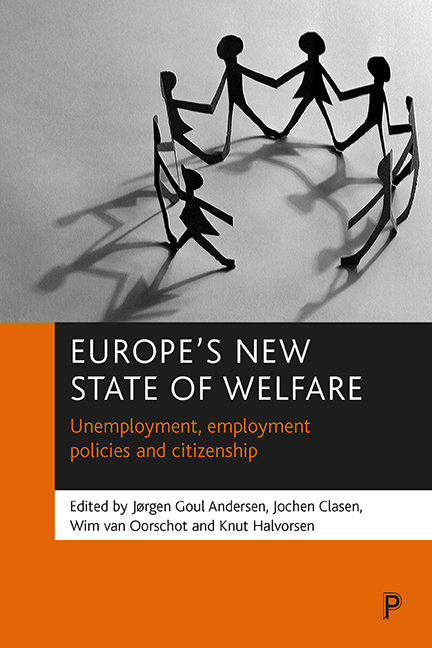Book contents
- Frontmatter
- Contents
- Notes on contributors
- Glossary
- Preface
- one Changing labour markets, unemployment and unemployment policies in a citizenship perspective
- two Employment and unemployment in Europe: overview and new trends
- three Unemployment and unemployment policy in the UK: increasing employability and redefining citizenship
- four To be or not to be employed? Unemployment in a ‘work society’
- five France: the impossible new social compromise?
- six Labour market participation in the Netherlands: trends, policies and outcomes
- seven Is high unemployment due to welfare state protection? Lessons from the Swedish experience
- eight Denmark: from the edge of the abyss to a sustainable welfare state
- nine Unemployment and (un)employment policies in Norway: the case of an affluent but oil-dependent economy: the paradox of plenty?
- ten Unemployment and unemployment policy in Finland
- eleven Slovenia’s navigation through a turbulent transition
- twelve Unemployment and unemployment policy in Switzerland
- thirteen Work, welfare and citizenship: diversity and variation within European (un)employment policy
- References
- Index
- Also available from The Policy Press
five - France: the impossible new social compromise?
Published online by Cambridge University Press: 20 January 2022
- Frontmatter
- Contents
- Notes on contributors
- Glossary
- Preface
- one Changing labour markets, unemployment and unemployment policies in a citizenship perspective
- two Employment and unemployment in Europe: overview and new trends
- three Unemployment and unemployment policy in the UK: increasing employability and redefining citizenship
- four To be or not to be employed? Unemployment in a ‘work society’
- five France: the impossible new social compromise?
- six Labour market participation in the Netherlands: trends, policies and outcomes
- seven Is high unemployment due to welfare state protection? Lessons from the Swedish experience
- eight Denmark: from the edge of the abyss to a sustainable welfare state
- nine Unemployment and (un)employment policies in Norway: the case of an affluent but oil-dependent economy: the paradox of plenty?
- ten Unemployment and unemployment policy in Finland
- eleven Slovenia’s navigation through a turbulent transition
- twelve Unemployment and unemployment policy in Switzerland
- thirteen Work, welfare and citizenship: diversity and variation within European (un)employment policy
- References
- Index
- Also available from The Policy Press
Summary
Introduction
Since the 1980s, France has been experiencing high rates of unemployment, which, in comparison to certain European countries, appear particularly difficult to reduce (see Chapter Two of this volume).
France is often stigmatised for the extreme rigidity of its economic framework and especially of its labour market, and excessive employment protection, in particular, which prevent companies from becoming more competitive and aggressive on international markets. However, it is an overstatement to say that France has not reformed its institutions. Liberalism-driven programmes, to be discussed in this chapter, have renewed institutional settlements. Nevertheless, formal macro compromises seem difficult to engineer, although the state (especially under the socialist governments) tried to foster collective bargaining.
This chapter shows that the country has indeed tried to reform its institutions towards a certain liberalisation but that, at the same time, it has made sure that the market has not been allowed to govern all aspects of life. This results in a somewhat harsh and conflicting path of institutional reform which may be specific to France. However, it can be said that France is not necessarily condemned to rigidity but is building its own way to flexibility.
Unemployment patterns in France
For two decades, Europe has faced severe problems of unemployment, particularly in comparison to the US. French social history often stands as the most illustrative of these difficulties. Unemployment has risen constantly from less than 3% in 1974 to 10.5% in 1987. Following a dip in 1988 and 1989, it rose again in the 1990s and reached about 12.5% in 1995-97 (Figure 5.1). Its rapid decline since 1998 – down to 8.6% in 2001 – was subsequently halted, and it creeped back up to 9.1% in April 2002.
During these decades, unemployment stemmed from frustratingly slow growth in the employment level compared to the increase in the size of the labour force. The latter is mainly the result of growing female participation (and demographic change), which more than offset declining economic participation in early and late working life. In France, young people enter the labour market at an average age of 21; the legal retirement age is 60, and early retirement has often been a way for firms to cut back on staff without social disturbances.
- Type
- Chapter
- Information
- Europe's New State of WelfareUnemployment, Employment Policies and Citizenship, pp. 91 - 106Publisher: Bristol University PressPrint publication year: 2002
- 1
- Cited by



